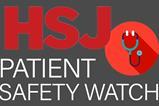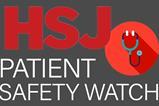HSJ hosts the Patient Safety Watch newsletter, written by Patient Safety Watch chief executive James Titcombe.
Good afternoon and welcome to the latest edition of the Patient Safety Watch newsletter.
Patient safety ‘the first and most important lesson’ to be learned from infected blood scandal
The long-awaited infected blood scandal report has identified a “failure to make patient safety the paramount focus of decision-making and of action”.
More than 3,000 deaths to date have been attributed to infected blood, blood products and tissue, with thousands more people infected with hepatitis C. The inquiry identified several examples it believed could have had a different outcome had patient safety been a bigger priority, including delaying the introduction of screening blood for hepatitis C. It also pointed to cases where blood products were “used unnecessarily, being wrongly seen by many clinicians to be little or no risk”.
Inquiry chair Sir Brian Langstaff described what happened as “not an accident”, pointing to instances of “downright deception”, “hiding the truth” and destroying documents, adding the response from authorities “compounded people’s suffering”.
The report concluded: “The first, and most important lesson, is that the first, and paramount consideration should always be safety. What happened would not have happened if safety of the patient had been paramount throughout.”
Health and social care secretary Victoria Atkins said her department would “study the report to make sure the lessons… are learned and that these mistakes can never be repeated”.
My view? The Infected Blood Inquiry report sheds light on one of the gravest healthcare scandals in UK history, but the report echoes only too familiar patterns repeatedly seen in healthcare scandals. As former health secretary Jeremy Hunt told the inquiry in 2022, sometimes institutions and the state “close ranks around a lie” — there are enough major inquiry reports now to know this isn’t a one-off phenomenon and we have yet to find an adequate solution.
Sir Brian makes important recommendations in his report and taking these forward must be an urgent priority for the next government. However, addressing the deeper issues at the heart of the problems identified is a monumental challenge, requiring a culture shift that spans our political system as well as healthcare institutions.
Instead of a system that “closes ranks around a lie”, we need one that closes ranks around openness, honesty and always putting patient safety first.
More positively, it is encouraging that ministers have announced details of a compensation scheme for victims of the scandal, with interim payments expected to be made over the summer and a total cost of redress under the scheme expected to be in the region of £10bn.
Meanwhile, however, those harmed by valproate and pelvic mesh due to issues identified in 2020’s First Do No Harm report are still awaiting a government response to the redress recommendations made in the Hughes Report earlier this year.
In other news this edition…
Thirlwall Inquiry highlights patient safety implementation gap
The Thirlwall Inquiry into the Lucy Letby case has undertaken a comprehensive review of inquiries that have taken place in England and Wales, spanning the Ely Hospital Inquiry (1969) through to the East Kent Investigation (2022), examining the extent to which recommendations have been implemented.
It’s a stunningly detailed and thorough piece of work but makes for stark and disappointing reading, concluding a large percentage of recommendations have not been fully implemented. This issue has been covered in previous newsletters and, in my view, this is further evidence we need a different model for such inquiries.
Martha’s rule to be rolled out to 143 hospitals
NHS England has announced Martha’s rule — the round-the-clock right for patients, their families or their carers to request a second opinion if they fear their or their loved one’s condition is worsening — will be rolled out to 143 hospitals in its first year. The initial target was for 100 sites to be involved by March 2025.
The scheme is named after 13-year-old Martha Mills, who died from sepsis in 2021 after doctors failed to act on her family’s concerns until it was too late.
Martha’s parents Merope Mills and Paul Laity said: “We are pleased that the roll-out of Martha’s Rule is off to a flying start and that the need for it has been so widely recognised.”
World Health Organization launches Global Patient Safety report
The World Health Organization has released its first Global Patient Safety report. It offers a comprehensive overview of patient safety measures globally, aligned with the Global Patient Safety Action Plan 2021–2030, alongside detailed analysis and summaries highlighting the burden of unsafe care and case studies on strategies to enhance healthcare safety globally.
Since the 2016 establishment of the annual ministerial patient safety summits, there has been considerable global momentum and leadership in patient safety, with the landmark World Health Assembly resolution in 2019: Global action on patient safety identifying patient safety as a global health priority and establishing World Patient Safety Day.
This global report is a fantastic resource that highlights the scale of the challenge, the progress made and the opportunities to create safer healthcare systems globally through collaboration and sharing learning. Please read it.
Watchdog warns paediatric wards unsafe for children needing mental health care
A report from the Health Services Safety Investigations Body has warned paediatric wards are often an unsafe environment for children who need to be admitted to them for mental health needs.
The watchdog added that when efforts are taken to improve the environment’s safety, they are too often limited to physical safety, with little done to address mental wellbeing, which leads to a restrictive environment. This environment in turn created “more conflict situations including increased aggression, physical and verbal abuse, rule-breaking, medication refusal, leaving the hospital without permission (absconding), and self-harm”.
HSSIB also found that, between 2021 and 2022, nearly 40,000 admissions to an acute inpatient ward for patients aged five to 18 were due to mental health reasons.
HSSIB senior safety investigator Saskia Fursland said: “Parity of esteem and better integration of children’s mental and physical health care is a national priority with many programmes of improvement work underway. However, the design of the paediatric ward is a patient safety risk that has not been previously explored. Our report is an important piece of evidence showing that the environment could be deemed to be physically safe but does not provide the emotional safety truly needed for those who are most vulnerable.”
More than 200 people in the last four years killed by somebody with a mental health disorder
A Sunday Times investigation has found 233 people have been killed in the past four years by somebody with a mental health disorder, highlighting tragic cases where the perpetrator was only able to carry out their attack because no inpatient bed was available for them.
Claire Murdoch, NHSE’s national director for mental health, told The Sunday Times: “The reality is there is still a big treatment gap, although we’re treating one million more people a year now compared to in 2016-17, we’re still letting too many people tip into crisis who if there had been more services sooner, wouldn’t have got to that point. Inpatient services in mental health are running red hot.”
Sharing some good stuff…
Developing a safe and supportive environment where staff can deliver high-quality patient care
The King’s Fund (in partnership with Spire Healthcare) is running a free online event on 5 June from 12-1pm.
The session will cover: the link between working culture and high-quality patient care; how leaders can build a safe, supportive working environment that drives quality; how a culture of quality can support staff wellbeing and resilience; and how successful quality-improvement strategies focus on staff engagement and experience.
MBRRACE-UK Online Course 2024
MBRRACE-UK (Mothers and Babies: Reducing Risk through Audits and Confidential Enquiries across the UK) has confirmed two new free course dates starting from 3 June 2024. The two courses — one for perinatal and one for maternal — will examine the lessons learned from the 2023 reports.
PHSO updates good complaints handling guides
The Parliamentary and Health Service Ombudsman has updated its NHS complaints standards webpage, with resources to support NHS organisations, such as a model complaint handling procedure, good complaint handling guides, sample letters and forms.
Before signing off, I was saddened by the Nursing and Midwifery Council’s announcement that Andrea Sutcliffe was stepping down as chief executive due to poor health.
Ms Sutcliffe joined the NMC at a difficult time for the organisation. Although I do not doubt there is much work still to do, you can see from the many responses to Ms Sutcliffe’s announcement on X just how well thought of she is. I’ve been lucky enough to have known Ms Sutcliffe for some time as both a colleague and friend. I don’t think it would be possible for anyone to be more hard-working or caring.
You will be badly missed, Ms Sutcliffe. We send you our very best wishes for the future and hope you make a full and swift recovery.
That’s all for this edition. Please look out for our next newsletter in two weeks’ time. Thanks for reading and please stay safe.
James Titcombe































No comments yet